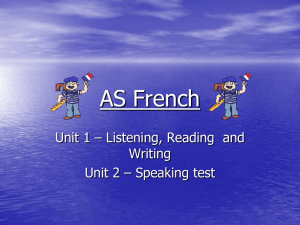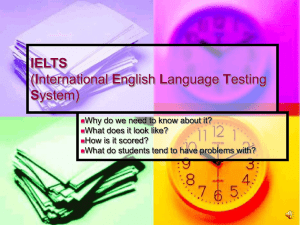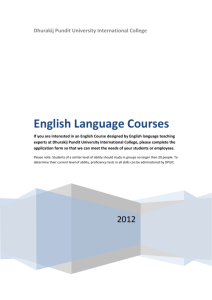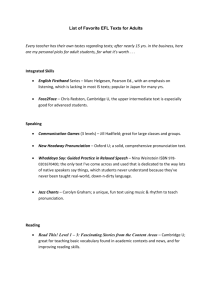Lesson Organization for a Class in Reading
advertisement
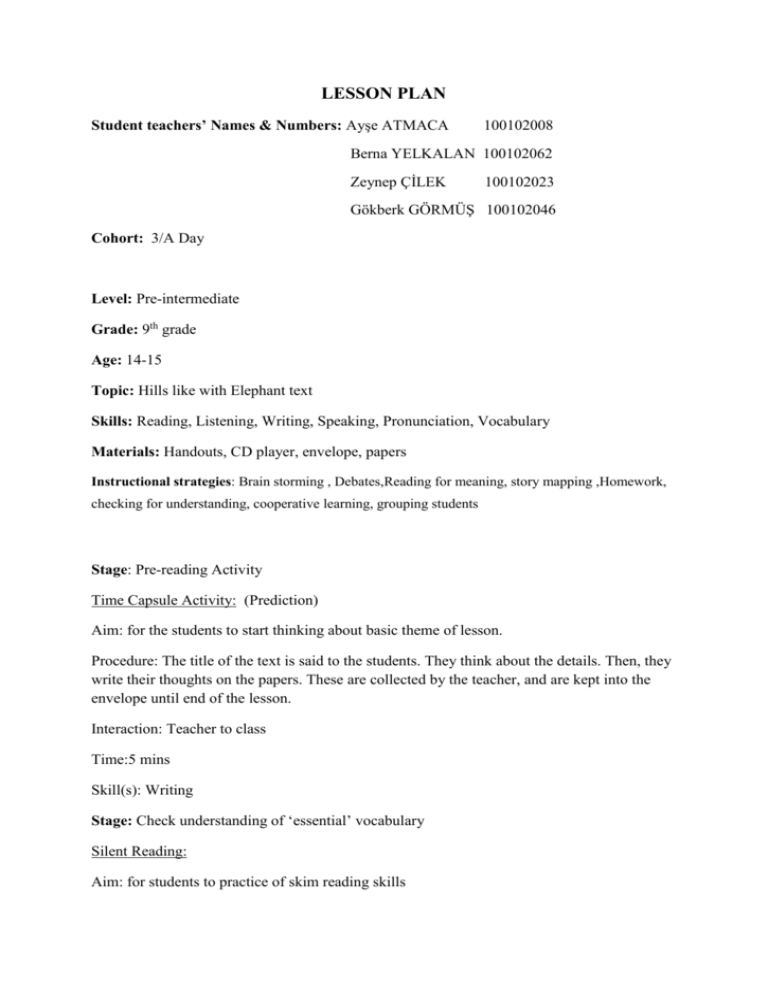
LESSON PLAN Student teachers’ Names & Numbers: Ayşe ATMACA 100102008 Berna YELKALAN 100102062 Zeynep ÇİLEK 100102023 Gökberk GÖRMÜŞ 100102046 Cohort: 3/A Day Level: Pre-intermediate Grade: 9th grade Age: 14-15 Topic: Hills like with Elephant text Skills: Reading, Listening, Writing, Speaking, Pronunciation, Vocabulary Materials: Handouts, CD player, envelope, papers Instructional strategies: Brain storming , Debates,Reading for meaning, story mapping ,Homework, checking for understanding, cooperative learning, grouping students Stage: Pre-reading Activity Time Capsule Activity: (Prediction) Aim: for the students to start thinking about basic theme of lesson. Procedure: The title of the text is said to the students. They think about the details. Then, they write their thoughts on the papers. These are collected by the teacher, and are kept into the envelope until end of the lesson. Interaction: Teacher to class Time:5 mins Skill(s): Writing Stage: Check understanding of ‘essential’ vocabulary Silent Reading: Aim: for students to practice of skim reading skills Procedure: The text is given to the students. Firstly, they are asked to read silently and to highlight the words that they don’t know. The meanings of the words are tried to be found by the students via discussion. Interaction: Students to students , teacher to class Time:15 mins Skill(s): Reading, speaking, vocabulary Stage: While Activity (A listening for gist task, reading for detail) Listening Part: Aim: for students to practice gist and intensive reading skills developing listening skills for specific information Procedure: After they students learn the unknown words, they listen the text two times via CD player for improving pronunciation and listening skills. Interaction: Teacher to class Time:20 mins Skill(s): Listening, Pronunciation Stage: Practice (Ordering) Aim: for the students to have practice in intensive reading Procedure: The sentences that summarize the text are given to the students disorderly after listening. They are asked to order these sentences correctly to see whether they understand the text or not. Interaction: Students to teacher, teacher to students Time:5 mins Skill(s): Stage: Practice 2 Aim: Star Diagram activity: Procedure: They are asked to make a star diagram which includes plot, time, characters, climax and vocabulary parts. Interaction: Students to students, students to teacher Time: 10 mins. Skill(s): Writing, Vocabulary Stage: Post-Activity - Discussion Part Aim: students have spoken practice about giving topic Procedure: The class is divided into two groups. While one of the groups support him and his thoughts, the other group support her and her thoughts. Interaction: Students to students, teacher to students, students to teacher Time:20 mins Skill(s): Speaking Stage: Check understanding Aim: to provide a written record of the target language Homework: (What if activity) Procedure: The students are asked to write the end of the story according to their own thoughts via “what if….” structure. Interaction: Teacher to class Time:5 mins Skill(s): Writing Aim(s) & Outcome(s): Cognitive: 1. to start thinking about basic theme of lesson. 2.. to practice of skim reading skills 3. to practice gist and intensive reading skills 4. developing listening skills for specific information 5. to have practice in intensive reading 6. to provide a written record of the target language Sts will be able to ; 1.1.to predict something related to the theme. 2.1.learn how to skim the text. 3.1improve their listening skills and learn the new words via text. 4.1 associate the relation between part and the whole. 5.1 to identify in details. 6.1 improve how to write in English via the homework. Socio-affective: 7. Motivating students for the reading activities. 8.Making reading enjoyable by using a funny topic 9.Working collaboratively with their classmates. Sts will be able to ; 7.1Show awareness of the importance of the reading. 8.1 Join the activities voluntarily. 9.1 Work with their classmates without causing any problem. Psychomotor: 10. pronouncing the words correctly. Sts will be able to; 10.1 pronunce the names of the words correctly. Anticipated problems Form: Students are familiar with the tenses used in the reading text. Therefore, related to form they will have no problem. Meaning: Students may not know vocabulary in the text. Pronunciation: Students may have difficulty in pronuncing some words and names. Solutions: Meaning: I will provide the definitions before students read the text. Pronunciation: I will be a good model to students. I will give immediate corrective feedback.
